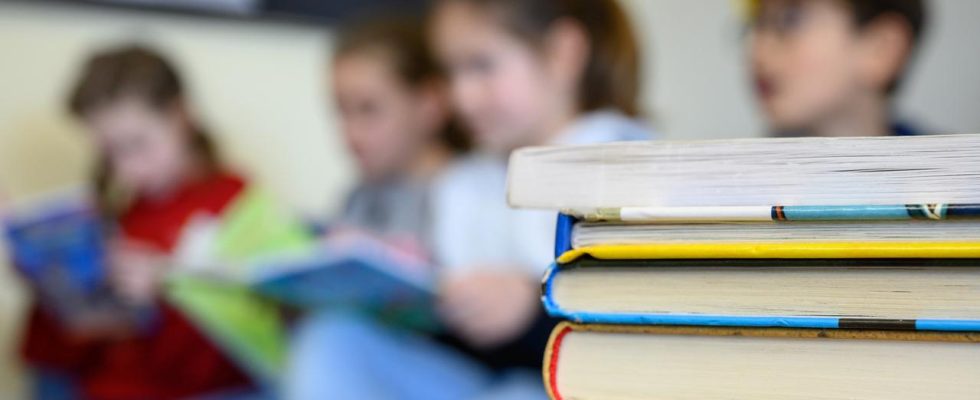In fourth grade, more and more students show weaknesses in reading. They fare far worse than their peers in many other countries. According to the current IGLU study, this is also due to the consequences of the corona pandemic, but not only.
In Germany, about a quarter of all fourth graders have difficulties reading. 25 percent of children in this age group do not reach the minimum level of text comprehension that would be necessary for the requirements later in school. This is the result of the current international primary school reading study, IGLU.
The number of primary school children with reading comprehension weaknesses has increased significantly in recent years. Overall, the students participating in the study achieved 524 points in the area of reading literacy. For comparison: In the previous IGLU study, which was published in 2016, the fourth graders nationwide had still achieved 537 points. In 2001 it was 539 points. After an initial improvement in the mid-2000s, the German score has fallen to a low for the third time in a row.
The proportion of students who did not have the text comprehension that would be necessary for the requirements later in school was 19 percent in 2016 and 17 percent in 2001.
Germany below the EU average
In an international comparison, Germany is below the average of the EU countries, which is 527 points. The study shows the same value for the 38 countries that belong to the Organization for Economic Cooperation and Development (OECD).
Out of the 65 countries and regions worldwide participating in the IGLU study, Singapore took the top spot with 587 points. This is particularly remarkable since the East Asian island state was still well behind Germany in the first survey in 2001, according to Nele McElvany from the TU Dortmund, who led the study. South Africa is in last place with 288 points.
High motivation to read outside of school
Despite the increased proportion of pupils with an insufficient understanding of the text, the study found that the children had a high level of reading motivation in an international comparison. 63 percent of them said they read at least half an hour a day outside of school. The average in the other EU countries was 54 percent and within the OECD only 53 percent.
However, too little is read at school, according to another conclusion of the IGLU study. On average, 141 minutes of lesson time per week is used for reading lessons or reading activities in Germany. Across the EU, fourth graders get an average of 194 minutes per week. With a view to the OECD countries, it is even 209 minutes.
Nationwide, more than 250 fourth graders participated
The IGLU study has been carried out every five years since 2001. The Institute for School Development Research at the TU Dortmund is responsible. The study is funded by the Federal Ministry of Education and the Conference of Ministers of Education.
In 2021, 252 fourth graders nationwide with around 4,600 students took part in the current study. A total of around 400,000 children took part in the tests. The fourth graders each received factual and narrative texts and the associated comprehension tasks, which they had to solve on laptops.
Negative trend even before Corona
The authors of the study assume that school closures during the corona pandemic could also have led to greater weaknesses in reading.
Other education tests had already warned of the effects of the Corona requirements, such as the IQB education trend 2021, which was published in October 2022. This study also came to the conclusion that the skills of school children in the fourth grade are decreasing in the subjects German and mathematics. However, this negative trend was already apparent before the outbreak of the pandemic.
The IGLU study also cites other causes for the declining level of reading performance, such as classes that are becoming more heterogeneous. This would pose greater and more diverse challenges for teachers.
However, one thing has hardly changed in the past 20 years, according to another conclusion of the study: the so-called social disparities in reading skills. Which means that children from “socio-economically disadvantaged families” are more likely to have reading difficulties.
Reading as a “foundation for educational success”
Federal Education Minister Bettina Stark-Watzinger called the results of the IGLU study “alarming”. “Being able to read well is one of the most important basic skills and the foundation for educational success,” emphasized the FDP politician. Germany urgently needs a turnaround in educational policy. The focus must be primarily on elementary schools and on strengthening basic skills such as reading, writing and arithmetic.
Katharina Günther-Wünsch, President of the Conference of Ministers of Education and Berlin Senator for Education, also sees reading promotion as “one of the most important measures to enable children and young people to successfully complete their education and thus a successful start in professional life”. Without a minimum standard of reading comprehension, “social participation” is only possible to a limited extent. With a view to the results of the IGLU study, Günther-Wünsch appealed to the federal states to “search for quick, effective and sustainable solutions together”. The support from the federal government is “extremely important”.

